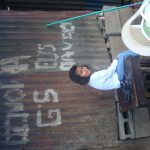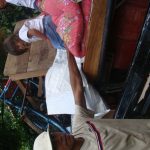Translation By: Camilla Born
In the small village of San Juan Del La Concha, Nicaragua, tucked somewhere between the winding road to La Concha and the community park, is a small dirt road that leads to La Mariposa, School of Spanish. Daniel, an employee, rocks slowly back and forth on the patio. His skinny body is tossed to one side of the chair.
He feels quite comfortable here now, “among friends.” He peers up, his baseball cap pulled down over his eyes, smiles, then quickly covers his face with his fingers as he talks in rapid Spanish. Every other sentence he breaks into a smile and brushes his head to the side.
In his life, he is not used to people asking him questions. He is not used to this kind of attention, for people to be interested in his story.
It wasn’t but a few weeks ago that another employee caught Daniel stealing plastic off the grounds that was covering some earth. When the owner Paulette Gouge, a thin British woman with a who-the-hell-do-you-think-you-are attitude, came to inquire why he was stealing, she found he had a rather good answer.
“He told me that he needed the plastic to fix his roof because, when it rained, he couldn’t seem to keep his children dry,” Paulette later said. “I said, ‘screw the earth, take the plastic.'”
Daniel now recounts the incident with much delight.
“She told me I could have a job,” he said. “I didn’t think she would give me an opportunity like that. I hadn’t had one like that before.”
Paulette told him to be there the next morning at eight. He was there by seven.
Like Daniel, 28% of the population of Nicaragua live below the poverty level. He grew up in a poor family in Managua, with little chance to attend school. He got to the fourth year of secondary school and had to quit to start working.
“When my daughter turns six, she will go to school. I want her to be what I wasn’t able to become. I wasn’t able to succeed at what I wanted to do in my life.”
Daniel has two daughters, four and two, with his wife and one son with another woman. His two daughters live with him and his wife in Managua, while his son lives in La Concha. He provides for all three.
Daniel’s conversation is interrupted by another traveler gathering around him. He blushes and turns his head to the side but says its fine. They all have questions for him.
One points at his tattoo — a red tear drop outlined in black. Daniel reaches up and touches it.
“This is for my uncle, to remember how much I cried when he died.”
Daniel then says that it was his uncle who raised him.
Another asks if his life has changed since working at La Mariposa. He smiles and says yes a few times, as if in unbelief.
“Yes …” He paused for a second and lifts his hand to his face. “Since the moment I started working here, things have been better.”
Daniel says he’s bought new shoes for his kids and food for his family including rices, beans — the regular Nicaraguan fare he says — and many vegetables. He also bought his wife bread to sell in Managua.
When he came to La Mariposa, Daniel was desperate for work but he knew with “God’s help,” he would find something.
“With human beings, if its not one thing, its another,” he said. “Now, my problem is not money.”
His problem is that his house, made entirely out of Zinc, is deteriorating. He says the extra money he is saving is to buy new Zinc for his home.
“But,” he adds, “when I wasn’t working, I was always wondering when I would be working again.”
Forty-seven percent of the population of Nicaragua are under-employed, while another 4% are unemployed. Daniel makes more than 50% of the population — who less than two U.S. dollars per day — but still falls short of the basic standard of living.
“My girls have more food now. Its better and sufficient but its still not enough.”
Daniel was out of work, and now, even with work, he has many debts to pay back. For him, no work means no food for his family. Here, he has no kind of protection such as social security, when he finds himself suddenly out of work, which he says can happen at any moment. But not just work, he could be out of house and land at any moment, too. Two weeks ago, Daniel’s land lord sold the land he was living on and gave him a few days to move from San Marcos to Managua — a hour trek — with all his belongings.
He packed his house into the bed of a small two door pick-up truck, tarp, logs and all. In it were two beds, a small book shelf, three logs that made up the frame of his house and the pots and pans he owned, plus the family pig. Almost all of his belongings fit into the small bed frame of the truck, while he, his wife and his two daughters rode on top of the stuff down to Managua.
“It would have been expensive to move, to hire a truck, but Paulette let us use hers.”
Daniel fears for the same thing in Managua. He paid a one time cost of five hundred Cordobas or twenty-five U.S. dollars — almost a week’s pay — to live in the house that he is in now. But the downside is that Daniel and his family do not own the land. They could be forced to move out if it was sold.
“I hope we can stay there a long time,” he says.
As for now, Daniel has a good job at La Mariposa, where he feels he is among friends and spends his weekends taking his girls to a park with his wife.
“My dream is to keep working as long as I have the opportunity.”



